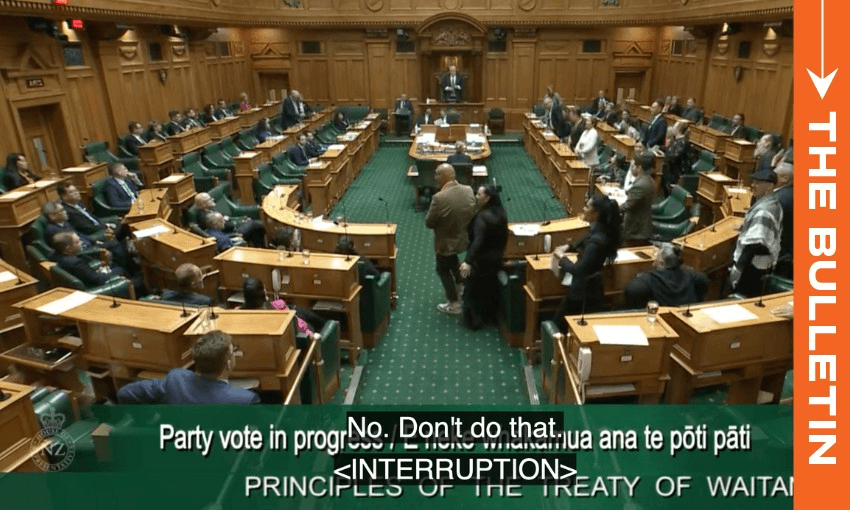And why one former MP, explains Stewart Sowman-Lund for The Bulletin, says John Key would never have allowed this to happen.
To receive The Bulletin in full each weekday, sign up here.
A huge day in the House
Before heading off for the comfortable confines of Apec in Peru, far away from any debate over Treaty Principles, prime minister Christopher Luxon fired one last shot at the bill his own government has just taken to select committee. “You do not go negate, with a single stroke of a pen, 184 years of debate and discussion, with a bill that I think is very simplistic,” the prime minister said, reported RNZ’s Craig McCulloch.
It may never make it into law (at least in this term of office), but it’s hard to deny the impact that Act’s Treaty Principles Bill has had over the past 12 months. Much of it, noted Newsroom’s Laura Walters, leading to a palpable feeling of division in the debating chamber and beyond. All of that came to a head with its first reading last night. The Spinoff’s Liam Rātana was, like many, watching the debate. As he noted, there were half a dozen attempts by Te Pāti Māori members to scupper the bill by raising points of order.
All were dismissed by the speaker, though the debate was later derailed – temporarily – by a remarkable haka led by the party, and followed by spectators in the public gallery and members of the Green Party. The Post’s Robert Kitchin, as always, masterfully captured the event in pictures.
‘See you next Tuesday’
Speaking of the haka, it prompted a staunch shut down from speaker of the house Gerry Brownlee who at times lost control of the debate. Proceedings in the house were paused after Brownlee ordered the packed public gallery be evacuated, which ThreeNews’ Jenna Lynch believed was the first time since the 1970s since such action was taken. For her role in leading the protest – which was seemingly known in advance to all but Brownlee – parliament’s youngest MP, Hana-Rawhiti Maipi-Clarke, was formally “named” and suspended from the House for 24 hours.
The Herald’s Claire Trevett (paywalled) argued Te Pāti Māori won’t give “two hoots” about the punishment, nor will Labour’s Willie Jackson who was ejected from the debate for refusing to apologise for calling David Seymour a “liar”. That language is unparliamentary, while other remarks – including Rawiri Waititi’s comparison of Seymour to the KKK – went unpunished. Waititi concluded his speech by telling the Act leader: “See you next Tuesday”. Possibly a reference to the impending arrival of a nationwide hīkoi to parliament, and possibly, well, something less savoury.
Key would never have let this happen
Speaking to Newstalk ZB’s Ryan Bridge this morning, former attorney-general Chris Finlayson said National had moved away from its past traditions in allowing the bill to make it this far, which disappointed him. The next six months – when the bill faces public scrutiny in select committee – will be a disaster, he added. “You’re going to get the crazies on the right and the crazies on the left coming in, you’ll get some sensible submissions but it’s not going to be a particular pleasant experience,” he said.
While criticising those who disrupted the parliament yesterday, Finlayson said that David Seymour should have realised there would be high emotions and it wouldn’t just be “sort of a nice polite little seminar”. But the former high profile MP directed his strongest critique for the prime minister, suggesting that his mentor Sir John Key would never have allowed this debate to happen. “I think Key would have said to Seymour, ‘you’re not getting it’. Call his bluff. And if Seymour had had a tantrum and said, ‘we’ll I’ll go to to the crossbenches’, I know what Key would have said: ‘Yeah, fine, do that and I’ll stand against you personally in Epsom at the next election, I’ll destroy you’.” (Key has previously expressed disapproval over the bill, such as in this interview with Mike Hosking).
In an interview with RNZ, Finlayson said that he believed the government’s actions will wind back positive progress made on race relations. “We were on such a good path in a bipartisan way, over many years we’ve been working toward trying to undo the burdens of the past so that we could move to the future together as one, and a lot of that’s being undone now.”
Vote followed party lines (as expected)
Ultimately, the vote on the bill went precisely as anticipated: Act’s caucus unanimously backed it, as did – somewhat begrudgingly – both National and New Zealand First. Opposition MPs opposed it. Earlier in the week, Green Party co-leader Chlöe Swarbrick called for the prime minister to allow a conscience vote on the issue – an attempt to moralise the debate and stop the government parties voting as unified blocs. “It’s time for the 123 members of this parliament to take personal, individual responsibility for whether the Treaty Principles Bill nonsense goes any further,” said Swarbrick. As noted by Toby Manhire on this week’s episode of Gone by Lunchtime, it wouldn’t be uncommon in some jurisdictions to see an MP “cross the House” during a heated debate such as this and vote alongside another party. Unsurprisingly, that didn’t occur.
Before jetting off to Peru, reported Jenna Lynch for Stuff, the prime minister shut down any suggestion he would allow his MPs to vote on the bill as a conscience issue. “We have a united view, which we just don’t think this is the right way forward.”
Editor’s note: An earlier version of this story mistakenly claimed only Act voted in support of the bill. That is, of course, incorrect, as the entire coalition voted to progress it select committee. Apologies, I blame my 5am Friday brain.

